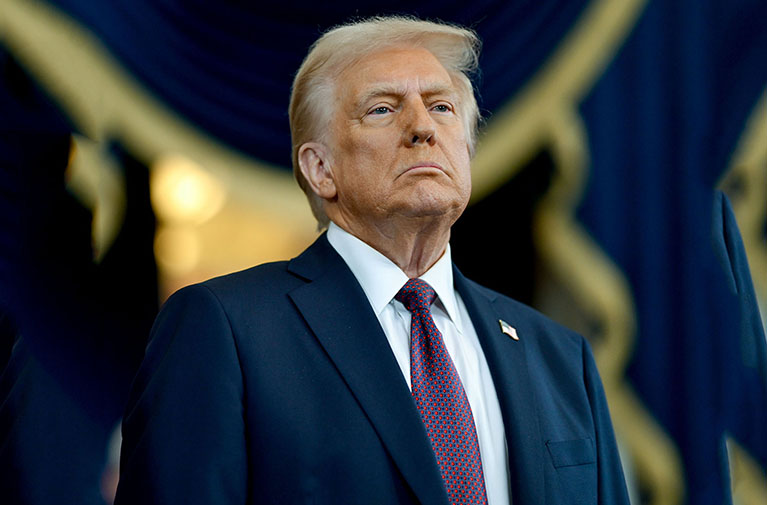Supreme Court Fast-Tracks Review of Trump’s Sweeping Tariffs, Setting Stage for High-Stakes Clash on Executive Power
Trump Tariffs – the U.S. Supreme Court agreed to expedite its review of President Donald Trump‘s controversial global tariffs, consolidating two major challenges and scheduling oral arguments for the first week of November. This accelerated timeline—far quicker than the typical schedule—signals the justices’ recognition of the policy’s enormous economic and political stakes, potentially deciding whether Trump can unilaterally impose duties on imports from nearly every country under a 1977 emergency law. The tariffs, a cornerstone of Trump’s second-term economic agenda, remain in effect during the appeal, but a loss could trigger refunds of up to $1 trillion and disrupt ongoing trade negotiations.
Background: The Tariffs and Legal Challenges
Trump’s “reciprocal tariffs,” announced on April 2, 2025, and dubbed “Liberation Day” tariffs, impose 10-50% duties on goods from major trading partners like China, the EU, Canada, Mexico, and India to address trade deficits, curb fentanyl trafficking, and pressure allies on issues like Russian oil purchases. Invoking the International Emergency Economic Powers Act (IEEPA)—a Cold War-era statute typically used for sanctions against adversaries like Iran—Trump bypassed Congress to enact these broad levies, marking the first time IEEPA has been wielded for widespread tariffs.
The policy has generated tens of billions in revenue, with the Congressional Budget Office projecting a $4 trillion deficit reduction over the next decade if upheld. However, critics argue it inflates consumer prices, harms U.S. exporters through retaliation, and exceeds presidential authority, as IEEPA does not explicitly authorize tariffs.
At least eight lawsuits have challenged the tariffs, including suits by seven small businesses (e.g., toy manufacturers Learning Resources and hand2mind) and a coalition of 12 Democratic-led states (led by Oregon). These plaintiffs contend the duties violate IEEPA, the Administrative Procedure Act, and constitutional separation of powers, as tariffs are traditionally a congressional prerogative under Article I.
Key Lower Court Rulings
[articlepage]
The cases stem from decisions in specialized trade courts:
- U.S. Court of International Trade (May 2025): Ruled that Trump’s “trafficking tariffs” (on China, Canada, Mexico) and “reciprocal tariffs” (on global partners) exceed IEEPA authority, as the law targets “unusual and extraordinary threats” but not routine trade imbalances or drug flows. The court issued injunctions but stayed them pending appeal.
- U.S. Court of Appeals for the Federal Circuit (August 29, 2025): In a 7-4 divided decision, affirmed the lower court, holding Trump “overreached” by using IEEPA for broad economic policy rather than true emergencies. The panel stayed its ruling until October 14 to allow Supreme Court intervention.
- D.C. District Court (Separate Case): Judge Rudolph Contreras issued a narrower injunction barring tariff collection from two toy companies, also stayed on appeal.
Plaintiffs, including trade law expert Ilya Somin, argue the tariffs act like “unlimited monarchical power” to tax Americans, potentially harming small businesses with higher costs.
The Supreme Court’s Action and Timeline
In a brief order from the court’s Public Information Office, the justices granted certiorari in two consolidated cases: Learning Resources v. Trump (businesses’ direct appeal) and Trump v. V.O.S. Selections (administration’s appeal of the Federal Circuit ruling). They allotted one hour for arguments in early November, with a fast-tracked briefing schedule and potential decision by year’s end—months ahead of the usual June timeline.
The Trump administration urged expedition, warning of “catastrophic” uncertainty disrupting trade talks (e.g., with India on Russian oil) and potential Treasury refunds of $750 billion to $1 trillion if the tariffs fall. Trump himself posted on X: “If we don’t win that, our country is going to suffer so greatly… These deals—all done—would have to be unwound.” Challengers agreed to fast-tracking, emphasizing the need for swift clarity on billions in duties.
This marks the first full merits review of a Trump second-term policy by the conservative-majority court, which has previously granted his emergency applications (e.g., on immigration) but not delved into underlying legality. The case may invoke the “major questions doctrine,” used to strike down Biden-era policies like student loan forgiveness, potentially cutting against Trump’s expansive IEEPA use.
Potential Outcomes and Implications
The court’s ruling could:
- Uphold the Tariffs: Affirming Trump’s IEEPA authority, solidifying executive power in trade and enabling further levies (e.g., on steel/aluminum, unaffected here).
- Strike Them Down: Invalidating the tariffs, forcing refunds and halting collections, though Treasury Secretary Scott Bessent claims alternative statutes exist for narrower duties.
- Partial Ruling: Allow some tariffs (e.g., targeted at true emergencies) while rejecting broad ones, clarifying IEEPA’s scope.
Economists warn of inflation spikes and growth drags if upheld, while supporters tout manufacturing boosts. Trade expert Tim Brightbill called it an “extremely important question involving billions—potentially trillions.” The decision, expected by late 2025 or early 2026, could reshape U.S. trade policy and test the limits of presidential authority amid Trump’s aggressive agenda.
